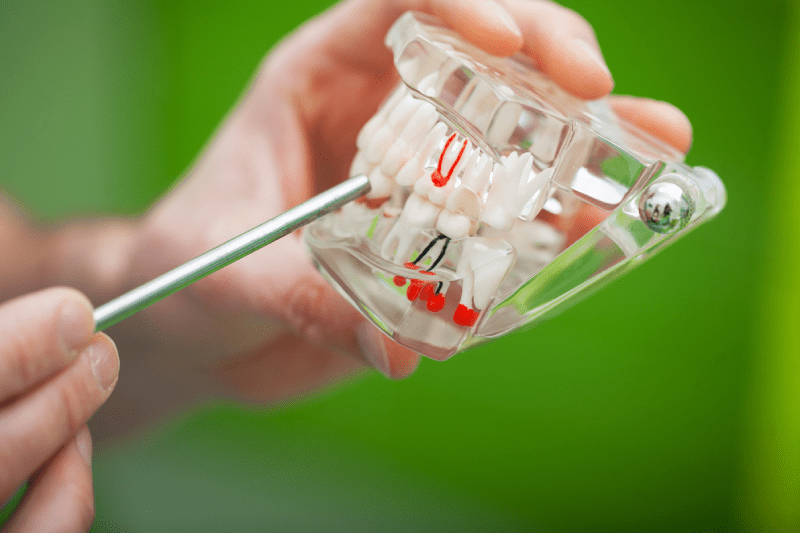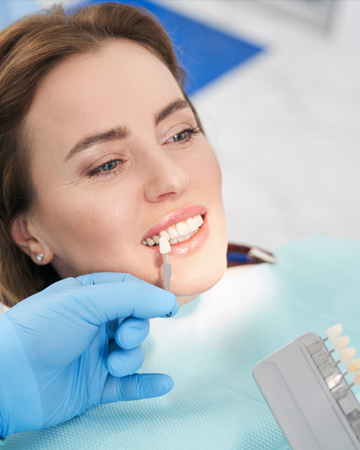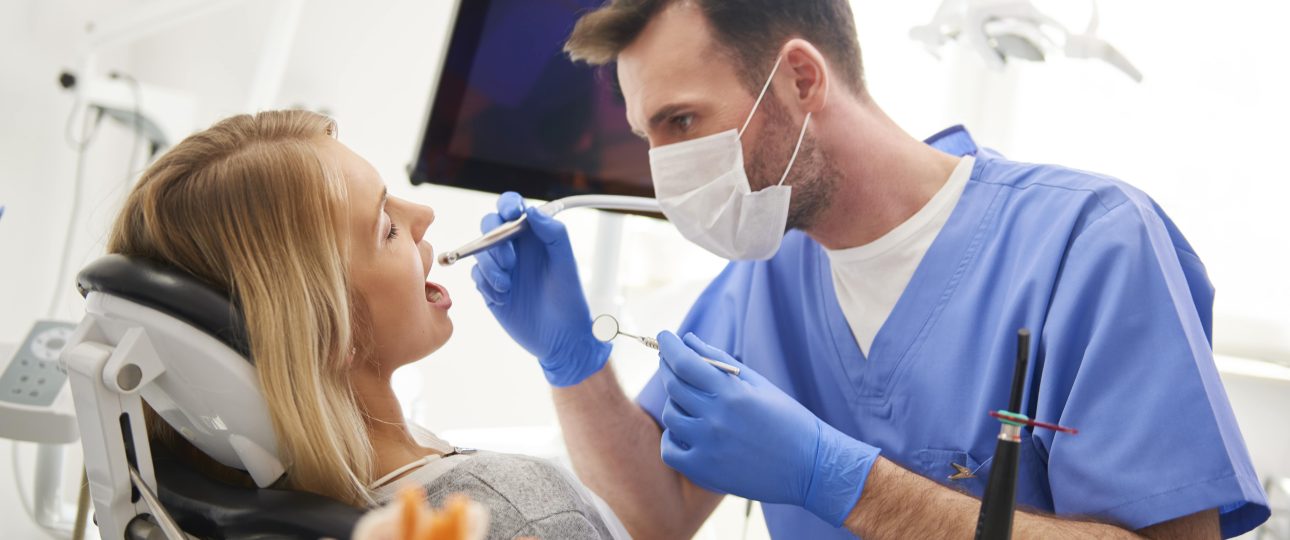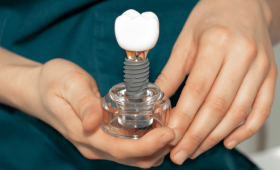How Much Does a Full Mouth of Dental Implants Cost in the UK?
Dental implants are a modern and effective solution for permanently replacing missing teeth. Full-mouth dental implant treatment provides a comprehensive restoration, both aesthetically and functionally, for patients who have lost all their teeth or have severely damaged ones.
The cost of this treatment in the UK can vary significantly depending on many factors. This content presents 35 of the most frequently asked questions about the cost of a full mouth of dental implants in the UK, along with detailed answers. It directs readers to contact Cure Holiday to determine the most suitable treatment plan for them.
How Much Do Full-Mouth Dental Implants Cost in the UK?
The cost of a full mouth of dental implants in the UK varies considerably based on many factors. On average, prices for a single arch can range from £5,000 to £22,000. The cost for a full-mouth implant procedure for both arches (upper and lower) can start from £18,000 and go up to £32,000. These prices differ according to the type of implant system used, the clinic’s location, and any additional treatment requirements.
What Are the Main Reasons for Price Differences?
The most fundamental reason for price differences is the complexity of the treatment plan. The dentist’s experience and the clinic’s location also directly affect the price. Clinics in major cities like London typically have higher prices. Furthermore, the implant brands and the materials used for the prosthetics also alter the cost. For example, premium brands like Straumann or Nobel Biocare are more expensive than more affordable local implant brands.
How Much Do Full-Arch Implants Cost for a Single Jaw?
The cost of a full-arch implant for a single jaw (upper or lower) in the UK varies depending on the chosen method. For All-on-4 implants, prices generally start from £9,500 and can go up to £20,000. If more implants are needed, such as in an All-on-6, the cost will also increase. These prices typically include the implants themselves, temporary prosthetics, and the final permanent dental prosthetic.
How Much Do Full-Mouth Implants Cost for Both Jaws?
Getting full-mouth implants for both the upper and lower jaws naturally doubles the cost. The price for this treatment usually ranges from £18,000 to £32,000. This price generally includes the implants, temporary and permanent prosthetics, consultations, and X-rays. However, additional treatments (such as bone grafting) can increase the total cost.

What Are All-on-4 Implants and What is the Cost?
All-on-4 is a technique that supports all the teeth in one arch with four strategically placed implants. This method is more economical than traditional implants because it requires fewer implants. In the UK, the price for a single arch of All-on-4 is typically between £9,995 and £20,000. This price is appealing to many patients as it reduces the need for additional procedures like bone grafting.
What Are All-on-6 Implants and What is the Cost?
The All-on-6 technique supports all the teeth in one arch with six implants. It is considered a more stable option than All-on-4 because it offers more support. The cost for a single arch of All-on-6 in the UK generally starts from £11,000 and can go up to £22,000. This method can provide better results for patients with a weaker bone structure and offers a longer-lasting solution.
Do Prices Vary Depending on the Implant Brand?
Yes, the implant brand used directly affects the cost. Internationally recognized and high-quality brands like Straumann, Nobel Biocare, and Astra Tech are generally more expensive than more affordable local brands. Premium brands offer better biocompatibility, higher success rates, and more long-lasting results.
What Is Included in the Treatment Price?
Full-mouth implant prices usually cover all stages of the treatment: initial consultations, panoramic X-rays and CBCT scans, the implant placement surgery, temporary prosthetics, and the final permanent dental prosthetics. However, each clinic’s pricing policy can be different, so it’s important to understand what is included in the price quote.
Can There Be Additional Costs?
Yes, in some cases, additional costs may arise. If the jawbone is not sufficient, additional surgical procedures like bone grafting or a sinus lift may be needed. These procedures are performed before implant placement and therefore increase the overall cost. Additionally, the material of the final prosthetic (acrylic, porcelain, or zirconia) can also affect the final price.
Are Financing Options Available?
Many UK clinics offer financing options to make full-mouth implant treatment more accessible. Patients can often pay for the treatment costs with installments spread over 12 to 60 months. Some clinics also offer interest-free financing for a specific period (e.g., the first 12 months). These payment plans divide the high cost into manageable installments.
What is the Cost of Treatment under the NHS?
The National Health Service (NHS) rarely covers dental implants, as they are generally considered an aesthetic procedure. Implant treatment under the NHS is only possible in very specific and serious cases (e.g., after an accident or due to a genetic condition) and is subject to a fixed fee of £319.10. However, for most patients, implant treatment is done at private clinics, and therefore the prices are higher.
How Long Does the Treatment Process Take?
Full-mouth implant treatment is typically a process that takes several months. The first stage involves the surgical placement of the implants and a waiting period of 3-6 months for the bone to integrate with them. After this healing period is complete, the permanent prosthetics are attached. However, with some fast methods like “Teeth-in-a-Day,” temporary prosthetics can be placed on the same day, and the process is shorter.
Is the Treatment Painful?
The implant placement surgery is painless as it is performed under local anesthesia. Patients do not feel any pain during the procedure. There may be some mild pain, swelling, and tenderness for a few days after the surgery, but this can be easily managed with prescribed painkillers. Many patients report that the recovery process is easier than they expected.
Are Full-Mouth Implants Permanent?
The implants themselves (the titanium screws) can last a lifetime with proper care and good oral hygiene. However, the prosthetics placed on top of the implants may wear down over time and may need to be replaced after an average of 10-15 years. Regular dental check-ups and good oral hygiene extend the life of the prosthetics.
Is There a Risk of Implant Failure?
Dental implant treatment has a very high success rate (95-98%). However, in rare cases, implants may fail to integrate with the bone or may fail due to infection. Factors such as smoking, diabetes, and poor oral hygiene increase the risk of failure. In case of failure, most clinics offer a revision surgery or a warranty service.
Am I a Suitable Candidate for the Treatment?
To be a suitable candidate, you need to be in good general health and have sufficient jawbone density. Conditions such as gum disease or uncontrolled diabetes can affect the success of the treatment. Your dentist will evaluate your suitability with X-rays and scans taken during the initial consultation.
Is Bone Grafting Necessary?
In areas where teeth have been missing for a long time, jawbone loss can occur. In this case, there may not be enough bone volume to support the implants. Bone grafting is a procedure performed to increase bone volume before implant placement. This additional procedure increases the cost and duration of the treatment.
How Should I Care for My Implants?
Caring for dental implants should be the same as caring for your natural teeth. You should brush twice a day and use floss to keep the prosthetics and gums around the implants clean. Specially designed brushes and water flossers can help clean hard-to-reach areas. Regular dental check-ups are also crucial for early detection of potential problems.
Does Smoking Affect the Treatment?
Yes, smoking is one of the biggest risk factors for implant treatment. Smoking slows down the healing process by reducing blood flow and makes it difficult for the implant to integrate with the bone. It also increases the risk of infection and can cause implant loss. Your dentist will strongly advise you to quit smoking before and after the treatment.
What Are the Advantages of Full-Mouth Implants over Traditional Dentures?
Full-mouth implants have many advantages over traditional dentures. Since they are fixed, there is no risk of them slipping or falling out. Chewing and speaking functions are better. They stimulate the jawbone, preventing bone loss and helping to preserve facial features. This provides patients with a higher quality of life and self-confidence.
How Do I Choose the Right Clinic for Treatment?
To choose the right clinic, you should research the dentist’s experience, the technology they use, and patient reviews. Make sure the clinic’s hygiene standards are high and choose a place that provides you with a detailed treatment plan. Also, find out if they offer post-treatment support and warranty services.
What Is the Waiting Time for Full-Mouth Implants in the UK?
The waiting time for full-mouth implant treatment in the UK varies depending on the clinic and the patient’s situation. In busy clinics, waiting times can be several weeks or months. However, some private clinics can offer faster appointments and treatment processes.
What Material Are the Implant Prosthetics Made Of?
Implant prosthetics are usually made from materials such as acrylic, porcelain, or zirconia. Acrylic prosthetics are more economical and are often used for temporary prosthetics, while zirconia and porcelain prosthetics offer more aesthetic, durable, and permanent solutions. Zirconia is known as the material that provides the most natural look to natural teeth.
When Are Full-Mouth Implants Necessary?
Full-mouth implants are necessary for patients who have lost all their teeth or whose remaining teeth are in a condition that cannot be saved. They are the best solution for those who have lost their teeth due to severe decay, advanced gum disease, or trauma.

When Can I Return to Normal Life After Treatment?
After implant surgery, you can usually return to light activities within a day or two. It is recommended to wait for a week before returning to work. However, this process varies from person to person, and it is important to follow your dentist’s advice.
How Do Dental Implants Feel?
Dental implants feel like your natural teeth. They are strong because they integrate with your jawbone and are resistant to chewing forces. This way, you do not experience the discomfort caused by traditional dentures.
What Is the Best Age Range for Implants?
There is no upper age limit for implant treatment, but it is generally applied to individuals over the age of 18 because jawbone development needs to be completed.
What is the Preparation Process Before Treatment?
Before the treatment, your dentist checks your oral health and examines your jawbone with imaging like X-rays and CT scans. If necessary, tooth extractions or other preparatory procedures are performed. This stage is critically important for a successful treatment.
Do Full-Mouth Implants Change My Facial Features?
Yes, full-mouth implants positively change your facial features. The jawbone, which gradually erodes due to missing teeth, causes the facial features to sink. Implants stimulate the bone, stopping this erosion and providing a younger, fuller facial appearance.
Can I Get My Implants in a Different Color Than My Other Teeth?
The color of your implant prosthetics is chosen to match the color of your natural teeth. However, if full-mouth implants are being done, the patient can choose a prosthetic in any color they want. For example, a brighter shade known as a “Hollywood smile” can be preferred.
How Do Implants Affect Chewing Function?
Since implants are fixed to the jawbone just like natural teeth, they completely restore chewing function. This allows patients to eat anything they want comfortably and also contributes to their digestive health.
Is There a Warranty for Full-Mouth Implants?
Many clinics offer a warranty service for implants. This warranty usually covers the implant itself and provides a free revision in case of failure. The warranty period varies by clinic, so it is important to clarify this before starting the treatment.
Is It Wise to Get Treatment Abroad?
Due to the high costs in the UK, many patients choose to travel to countries like Turkey for full-mouth implant treatment. Turkey offers high-quality treatment at more affordable prices, experienced dentists, and the opportunity for a vacation.
What Are the Disadvantages of Treatment in the UK?
The biggest disadvantage of full-mouth implant treatment in the UK is the high cost. Additionally, the limited NHS coverage can make access to treatment difficult. For this reason, many people look for private clinics or options abroad.
Why Are Clinics in the UK So Expensive?
Dental clinics in the UK have higher prices due to high operational costs, expensive insurance premiums, high staff salaries, and strict regulations. This causes treatment costs to increase.
If you’re looking for an alternative to the high costs in the UK, contact Cure Holiday, and let us create a personalized treatment plan for you to regain your smile.



